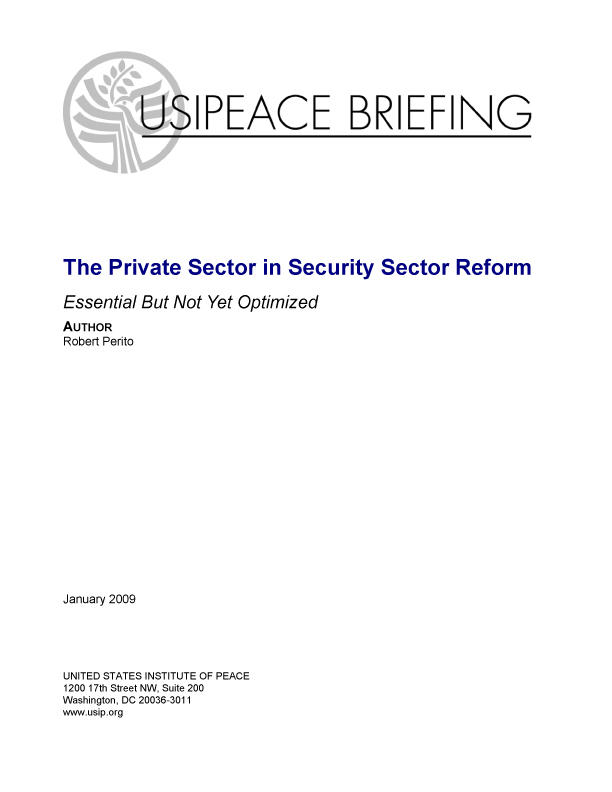While the U.S. and world economies are slowing markedly, Security Sector Reform (SSR) is a growth industry for the private sector. U.S. government employees may set SSR policy and design projects, but implementation is extensively outsourced to private contractors.

Introduction
With the forthcoming surge of U.S. military forces into Afghanistan, the U.S. Army has announced contracts worth $1.1 billion for the construction of military bases and training centers for Afghan military and police. Private firms supply everything from construction materials to trainers and administrative staff. Private contractors operating in Pakistan and Afghanistan are required to provide their own security. Up to 15 percent of the cost of construction will go to private security firms, which guard convoys, facilities and personnel.
While the role of the private sector has grown, the ability of government agencies to monitor its activities has not kept pace. A recent State Department Inspector General’s report1 noted that the activities of private security contractors have exceeded the Department’s ability to supervise them. The report also noted that the Department’s practice of hiring contractors to keep track of equipment and services used by other contractors was a possible violation of government regulations.
Is the U.S. government’s dependence on the private sector a cause for concern, or is there simply the need for a better understanding of the private sector’s role in Security Sector Reform? This question was addressed by a panel of distinguished experts at a recent meeting sponsored by the Institute’s Security Sector Reform Working Group. Principal speakers included:
- Deborah Avant, Author of the The Market for Force: The Consequences of Privatizing Security, and Professor of Political Science at the University of California, Irvine;
- Charles Snyder, Acting Deputy Assistant Secretary of State for Civilian Police and African, Asian and European Programs, Bureau of International Narcotics and Law Enforcement Affairs;
- Harry (Hank) Allen, Chairman of the Board of Directors, International Peace Operations Association and International Business Development Director, MPRI Corporation;
- Laura Engelbrecht; Vice President, North America, New Century Corporation
Robert Perito, director of the SSR Working Group and a senior program officer at USIP, moderated the panel. The following is a summary of views expressed during the meeting.
Notes
1. Policing the New World Disorder: Peace Operations and Public Security, Robert B. Oakley, Michael J. Dziedzic, and Eliot M. Goldberg (Eds.), (Washington D.C.: National Defense University Press, 1998), p. 511.
This USIPeace Briefing was written by Robert Perito, senior program officer in the Center for Post-Conflict Peace and Stability Operations at the United States Institute of Peace. The views expressed here are not necessarily those of USIP, which does not advocate specific policies.
The United States Institute of Peace is an independent, nonpartisan institution established and funded by Congress. Its goals are to help prevent and resolve violent international conflicts, promote post-conflict stability and development, and increase conflict management capacity, tools, and intellectual capital worldwide. The Institute does this by empowering others with knowledge, skills, and resources, as well as by directly engaging in peacebuilding efforts around the globe.